イベント&アクティビティ
Season’s Greetings and best wishes for the New Year
 Das Deutsche Institut für Japanstudien wünscht erholsame und frohe Festtage und einen guten Start in ein erfolgreiches Jahr der Schlange!
Das Deutsche Institut für Japanstudien wünscht erholsame und frohe Festtage und einen guten Start in ein erfolgreiches Jahr der Schlange!
The German Institute for Japanese Studies wishes you a happy holiday season and a successful Year of the Snake!
ドイツ日本研究所一同、皆様のご多幸と来るべき新年が成功の年になることを祈念いたします。
DIJ Newsletter Winter 2024/25
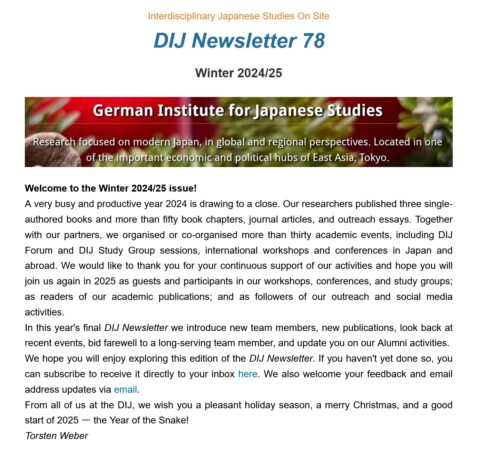 The winter issue of our DIJ Newsletter features updates on our research, publications, and events as well as news from the Institute, our team, and our alumni. We hope you will enjoy exploring this new edition of the DIJ Newsletter. If you haven’t done so yet, you can subscribe to receive our Newsletters directly to your inbox. The full issues and subscription form are available here.
The winter issue of our DIJ Newsletter features updates on our research, publications, and events as well as news from the Institute, our team, and our alumni. We hope you will enjoy exploring this new edition of the DIJ Newsletter. If you haven’t done so yet, you can subscribe to receive our Newsletters directly to your inbox. The full issues and subscription form are available here.
New book chapter by D.A. Neuhaus on Korea and the League of Nations
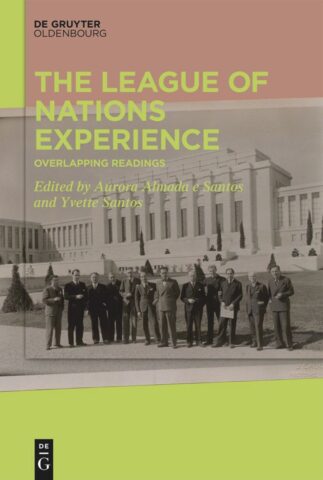
In his chapter “Korea and the League of Nations: from Versailles to the Manchurian Crisis, 1919–1933” Dolf-Alexander Neuhaus examines the relationship between the Korean independence movement and the League of Nations. The chapter elucidates the complex interactions between non-sovereign entities like Korea under Japanese rule and the international organization, offering insights into how Koreans and anti-Japanese nationalists perceived and engaged with the League of Nations during the interwar period. In 1919, when the League was established, Koreans were denied the right to self-govern. However, individuals and factions within the Provisional Government of the Republic of Korea still sought to utilize the League for their ends in the 1920s and early 1930s. By exploring these diplomatic and political dynamics, the chapter presents a nuanced picture of Korea’s struggle for recognition and national self-determination within the broader context of international politics. The chapter is published in The League of Nations Experience: Overlapping Readings (De Gruyter 2025).
Stellenausschreibung Direktorin/Direktor (m/w/d) DIJ Tokyo
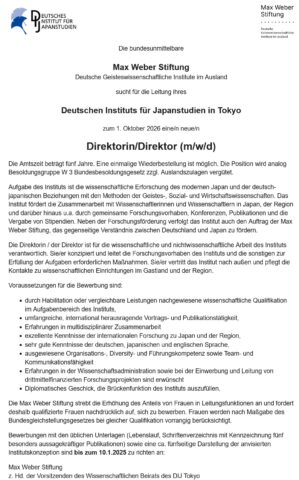 Die bundesunmittelbare Max Weber Stiftung – Deutsche Geisteswissenschaftliche Institute im Ausland sucht für die Leitung ihres Deutschen Instituts für Japanstudien in Tokyo zum 1. Oktober 2026 eine/n neue/n Direktorin/Direktor (m/w/d). Die Amtszeit beträgt fünf Jahre. Eine einmalige Wiederbestellung ist möglich. Aufgabe des Instituts ist die wissenschaftliche Erforschung des modernen Japan und der deutsch-japanischen Beziehungen mit den Methoden der Geistes-, Sozial- und Wirtschaftswissenschaften. Das Institut fördert die Zusammenarbeit mit Wissenschaftlerinnen und Wissenschaftlern in Japan, der Region und darüber hinaus u.a. durch gemeinsame Forschungsvorhaben, Konferenzen, Publikationen und die Vergabe von Stipendien. Neben der Forschungsförderung verfolgt das Institut auch den Auftrag der Max Weber Stiftung, das gegenseitige Verständnis zwischen Deutschland und Japan zu fördern. Weitere Informationen finden Sie hier
Die bundesunmittelbare Max Weber Stiftung – Deutsche Geisteswissenschaftliche Institute im Ausland sucht für die Leitung ihres Deutschen Instituts für Japanstudien in Tokyo zum 1. Oktober 2026 eine/n neue/n Direktorin/Direktor (m/w/d). Die Amtszeit beträgt fünf Jahre. Eine einmalige Wiederbestellung ist möglich. Aufgabe des Instituts ist die wissenschaftliche Erforschung des modernen Japan und der deutsch-japanischen Beziehungen mit den Methoden der Geistes-, Sozial- und Wirtschaftswissenschaften. Das Institut fördert die Zusammenarbeit mit Wissenschaftlerinnen und Wissenschaftlern in Japan, der Region und darüber hinaus u.a. durch gemeinsame Forschungsvorhaben, Konferenzen, Publikationen und die Vergabe von Stipendien. Neben der Forschungsförderung verfolgt das Institut auch den Auftrag der Max Weber Stiftung, das gegenseitige Verständnis zwischen Deutschland und Japan zu fördern. Weitere Informationen finden Sie hier
New book chapter by Nicole M. Mueller studies reception of Thomas Mann in Japan

In her book chapter “Thomas Mann bei Mishima Yukio, Kita Morio und Tsuji Kunio: Verehrungspathos und Neuverortung als Vorbedingungen einer produktiven kulturüberschreitenden Rezeption” (in German), DIJ researcher Nicole M. Mueller sheds new light on the reception of Thomas Mann’s literary works by the Japanese authors Mishima Yukio, Kita Morio, and Tsuji Kunio. The idealization of Mann had been an essential element of Japan’s cultural modernization and westernization in the first decades of the 20th century, making him one of the larger-than-life figureheads of Japan’s prewar academic elite. Mishima and his contemporaries developed novel modes of reception based on a critical analysis of Mann’s work. Nicole’s chapter examines the extent to which Mishima’s, Kita’s, and Tsuji’s reception of Mann was conditioned by historical context and what characteristics make cross-cultural literary reception “productive”. The chapter is published in the edited volume Thomas Mann produktiv rezipiert. Zum Fortleben von Werk und Autor (Brill/Fink 2025).
New issue of Contemporary Japan published
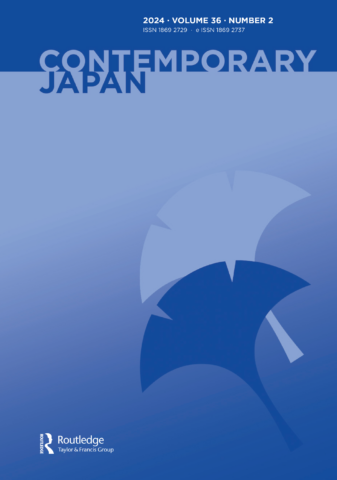
The new issue of Contemporary Japan (vol. 36, no. 2) features five research articles, the biennial 2023 VSJF award-winning paper, and a book review section. The research articles include an inquiry into the relevance and effectiveness of national apologies by Jane Munro; Ryotaro Takahashi addresses the relationship of income inequality and the size of the government in Japan; Ken Hijino analyzes the politics of depopulation in local elections; Silvia Croydon investigates the politics of inclusiveness in terms of consultation on disability policies; and Kristina Iwata-Weickgenannt and Aidana Bolatbekkyzy explore how foodscapes are invoked in critical commentary on the “capitalocene” in post-3.11 Japanese literature. The English translation of the VSJF award-winning paper by David Adebahr offers unprecedented access to the conversations and thought processes behind Japan’s security policy among key political actors in Japan. CJ’s book review section includes recent publications on religion and fundamentalism, the history of Kyoto, public discourse on fertility policies, and the use of robots in eldercare.
New open access article analyses impact of civic engagement on women’s well-being
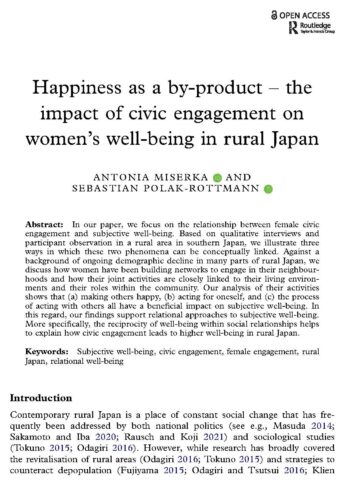 A new open access research article by Antonia Miserka (University of Vienna) and DIJ social scientist Sebastian Polak-Rottmann analyses the relationship between female civic engagement and subjective well-being. Their article “Happiness as a by-product – the impact of civic engagement on women’s well-being in rural Japan”, published in Japan Forum (online first), is based on qualitative interviews and participant observation in a rural area in southern Japan. The analysis shows that (a) making others happy, (b) acting for oneself, and (c) the process of acting with others all have a beneficial impact on subjective well-being. In this regard, the findings support relational approaches to subjective well-being. More specifically, the reciprocity of well-being within social relationships helps to explain how civic engagement leads to higher well-being in rural Japan. The article is an outcome of Sebastian’s research project Supplementing activities of resilience: The impact of demographic change on local activities and civic engagement.
A new open access research article by Antonia Miserka (University of Vienna) and DIJ social scientist Sebastian Polak-Rottmann analyses the relationship between female civic engagement and subjective well-being. Their article “Happiness as a by-product – the impact of civic engagement on women’s well-being in rural Japan”, published in Japan Forum (online first), is based on qualitative interviews and participant observation in a rural area in southern Japan. The analysis shows that (a) making others happy, (b) acting for oneself, and (c) the process of acting with others all have a beneficial impact on subjective well-being. In this regard, the findings support relational approaches to subjective well-being. More specifically, the reciprocity of well-being within social relationships helps to explain how civic engagement leads to higher well-being in rural Japan. The article is an outcome of Sebastian’s research project Supplementing activities of resilience: The impact of demographic change on local activities and civic engagement.
Book by Dolf Neuhaus on Korean-Japanese Interactions and Japanese Colonial Rule in Korea
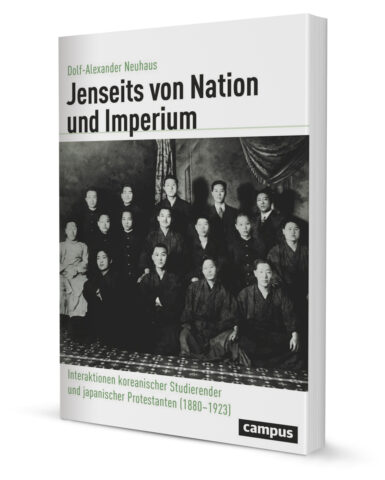
What role did Korean students who came to Japan between 1880 and 1923 play in the discourse on Japan’s colonial and East Asian policies? How did their encounter with Japanese intellectuals of Protestant faith, especially in the environment of the YMCA and the Imperial University of Tokyo, influence their views? Drawing on a wide range of Japanese and Korean sources, Dolf-Alexander Neuhaus‘ new book Jenseits von Nation und Imperium. Interaktionen koreanischer Studierender und japanischer Protestanten (1880–1923) (Beyond nation and empire. Interactions between Korean students and Japanese Protestants, 1880-1923) examines how these students and intellectuals discussed Japanese colonial rule in Korea and the ‘Korean question’ and how their exchange of ideas influenced Japanese and Korean perceptions of empire, nation, and East Asia. The book is based on Dolf’s doctoral dissertation and is published by Campus in the Global History series.










 Open Access
Open Access
